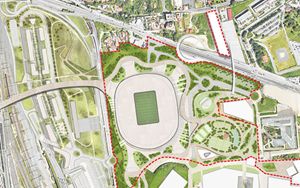(Finance) – A financial contribution from Roma Capitale is not foreseen for the intervention relating to the construction of the new football stadium in the urban area of Pietralata proposed by the AS Roma sports club. This is despite it being a project financing which, from a regulatory point of view, is compatible with the provision of public contributions of up to a maximum of 49%. This is what he clarifiedCapitoline administration during meetings within the Public debate on the project. The process started last July 25th by the Capitoline Council concluded today with the approval of the resolution containing the report on the outcomes of the public debate for the construction of Roma’s new stadium in Pietralata, presented by Nomisma.
The next procedural step – explains Nomisma in a note – provides for the delivery by AS Roma of the definitive project accompanied by a sworn economic-financial plan which must be approved by the Capitoline Assembly. In the same session, the Mayor’s representative will be indicated at the decision-making services conference which will be opened by the Lazio Region.
“We have demonstrated that we do things, not words. At this point it is up to Roma to present a project. We did what we had to do. And in record time. When Roma presents an executive project we will conclude the project process. But it is the demonstration that it is being taken seriously” commented theCouncilor for Tourism and Sport of Rome Capital, Alessandro Onorato.
One of the characterizing aspects of the Stadium Project which is the subject of the Public Debate, often specified by both the Municipal Administration and the Proponent, concerns precisely its nature of project financing, through which the Municipal Administration plans to entrust the long-term concession of public lands to the Proponent who, initially – we read in the final dossier of the debate – will deal with the construction of the Stadium and, subsequently, with its management. It was highlighted during the reports that the decisive aspect is the evaluation of the economic-financial balance of the Stadium Project. During the debate, some participants raised doubts regarding the economic-financial suitability of the Proponent and the actual sustainability of the management costs of the structure. Citizens, in fact, have repeatedly underlined how the Proponent currently has a negative net worth of 340 million euros and therefore does not have the requirements established by law to be able to develop the project.
The Municipal Administration and the Proponent have repeatedly recalled that the current one PEF (Economic Financial Plan) is to be considered preliminary and will only become definitive in a subsequent phase of the design. The Municipal Administration also specified that the verification phase of the Proposer’s requirements will be carried out after the presentation of the final project and before participation in the tender, as established by the Reads stadiums.
Another issue that has emerged on several occasions concerns the division of the burden of expenses, in particular the investment commitments on the part of both the Municipal Administration and the Proposer, on which the participants requested more information. Furthermore, other citizens’ concerns concerned the management of public works instrumental to the opening of the Stadium which, as specified in the resolution declaring public interest, will have to be borne by the Proponent.
The issue of predicting and was also raised finance active ticketing policies which promote virtuous behavior with respect to the environment and the social component on the part of citizens, as already mentioned in the section on environmental sustainability. The Proponent stated that in this project phase no real ticketing policies have yet been defined, but he reassured citizens several times on the fact that actions will be promoted that encourage the use of public transport, as happens in other European stadiums.
